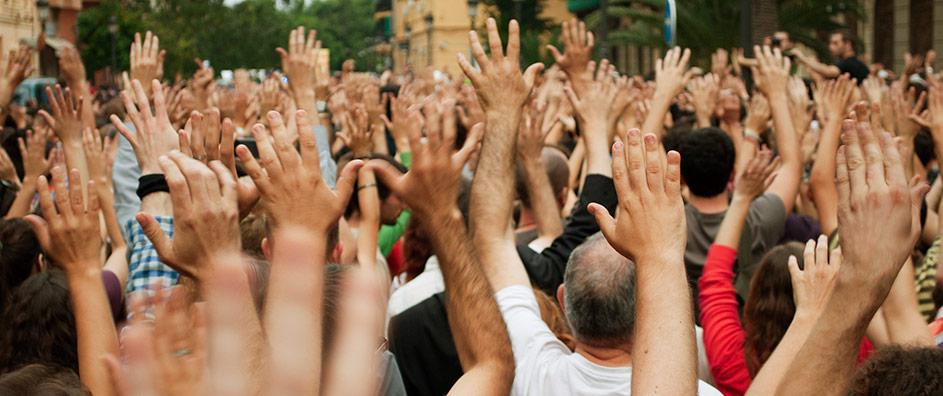The Baha’i Faith, a relatively nascent religion emerging in the 19th century, offers profound insights into the conditions fostering a democratic upsurge amid the turbulence of civil unrest. Historical contexts, alongside the religion’s core teachings, elucidate the underpinnings of societal transformation, revealing a mosaic of hope, agency, and interconnectedness. This article endeavors to dissect the intricate relationship between Baha’i teachings and the phenomenon of civil unrest, illuminating how these teachings herald a promise of societal evolution.
At the heart of the Baha’i doctrine lies the intrinsic belief in the oneness of humanity. This principle posits that all individuals, regardless of nationality, race, or creed, are part of a singular global family. This ethos provides a salient perspective during periods of upheaval, advocating for unity rather than division. In times characterized by civil unrest, when societal fractures often become pronounced, the Baha’i teachings encourage a convergence of disparate groups toward common goals. The invocation of universal brotherhood fosters resilience against the divisive narratives that often accompany disruptions.
Furthermore, the Baha’i emphasis on justice emerges as a critical factor in addressing the root causes of civil unrest. Justice in Baha’i thought transcends mere retribution; it embodies equity and impartiality, compelling individuals and societies to forge structures that uphold the dignity of every human being. When systemic injustices prompt populations to rise in protest, the Baha’i teachings promulgate the idea that genuine justice can only be achieved through collaborative efforts, underpinned by mutual respect and understanding. Such an approach not only addresses immediate grievances but also engenders a long-term vision for sustainable peace.
Within the scope of democratic principles, the Baha’i Faith champions the notion of participatory governance. By advocating for a system wherein every voice is heard and valued, the teachings propose a radical shift from autocratic models toward inclusive decision-making processes. This aligns seamlessly with the contemporary calls for democracy witnessed globally, as marginalized groups seek representation and agency. The Baha’i framework for governance emphasizes consultation, which serves as a pragmatic mechanism for collective decision-making. In an era where civil unrest often arises from disenfranchisement, the Baha’i model serves as an apt blueprint for engagement and empowerment.
The dynamics of authority and power, illuminated through the lens of Baha’i thought, further elucidate the conditions conducive to democratic upheaval. The Baha’i Faith asserts that true authority emanates from the consent of the governed. This principle is particularly resonant during periods marked by civil discontent, as individuals begin to question the legitimacy of traditional power structures. Baha’i teachings inspire a reevaluation of authority, encouraging citizens to challenge oppressive regimes and advocate for rights and freedoms that align with their intrinsic worth.
Moreover, the interconnectedness of societal challenges is emphasized in Baha’i teachings. The principle of unity in diversity underscores the understanding that the struggles of one group resonate with the broader human condition. In instances of civil unrest, the Baha’i perspective urges individuals to recognize their shared humanity, spurring a collective response to shared injustices. This holistic view fosters solidarity among varied groups, transcending superficial differences and igniting a passion for collaborative action that champions the rights of all.
Education, another cornerstone of Baha’i philosophy, plays a pivotal role in shaping the sociopolitical landscape. The teachings stress the necessity for the illumination of the mind as a precursor to societal transformation. This mandates an equitable education system that informs citizens of their rights, responsibilities, and the essence of civic engagement. By equipping individuals with knowledge, the Baha’i Faith aims to cultivate a more informed populace, capable of articulating their grievances and navigating the complexities of social change. Such empowerment is tantalizingly linked to the potential for constructive civil unrest, which seeks to reform rather than merely rebel.
The concept of moral leadership, as delineated in Baha’i doctrine, further encapsulates the factors contributing to a democratic upsurge in the face of civil unrest. Leaders inspired by Baha’i principles are called to embody integrity, humility, and service. This authentic leadership fosters trust and engenders a sense of community, crucial elements in consolidating efforts toward democratic change. During periods of unrest, charismatic leaders who espouse Baha’i values can unify disparate factions, offering a vision that transcends the immediate turmoil.
As the globe witnesses a resurgence of civil unrest in various forms, the Baha’i teachings proffer a contemplative lens through which to understand and navigate these tumultuous landscapes. By foregrounding concepts of unity, justice, inclusivity, and moral leadership, the Baha’i Faith maps out potential pathways that can engender systemic change. The inherent curiosity aroused by these teachings lies in their promise of a world where divisions yield to solidarity, and where civil unrest morphs into constructive dialogue and profound societal reformation.
In conclusion, the Baha’i perspective provides a rich tapestry woven from the threads of compassion, equity, and human interconnectedness. It posits that within the chaos of civil unrest exists an opportunity for metamorphosis; a chance to redefine societal values and cultivate a more democratic, just world. As individuals and societies grapple with the forces that incite unrest, the teachings of the Baha’i Faith stand as a beacon, illuminating the paths toward understanding and unity.
